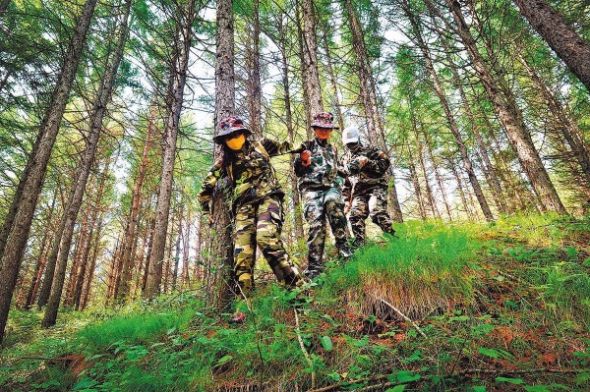
Rangers patrol the woodland. (Zou Hong/China Daily)
A tower in a sea of green
Liu Jun said he is lucky because he doesn't have to live in the type of makeshift tent his father occupied during his time as a fire watcher in the forest. The second-generation Saihanba resident has decorated the interior walls of his home-cum-workplace with black-and-white photos of the old structures, including his father's tent.
"To live in Saihanba is to live with history, there's almost nothing that meets the eye that isn't evocative," he said, referring to the forest that rolls in front of him every time he peers outside.
"Understanding how this greenery was born is both elevating and humbling."
Every spring and autumn, the seasons in which fires are most likely to occur, Liu picks up his binoculars every 15 minutes during daylight and once an hour at night to scan the forest for the slightest hint of smoke that might wreak havoc if left unattended. He has done this for the past 12 years.
His workplace, a 16-meter-high tower atop the highest peak in the forest, stands 1,940 meters above sea level. The howling wind provides a contrast to the forest below, calm as a waveless ocean.
It is easier to endure the wind than the cold, though. Throughout the year, the average temperature is about -2 C, but in the depths of winter it can plummet to -44 C.
Electricity became available in the early 2000s, but there was no hot water until three years ago. "Every October, I would haul as much firewood as I could into the tower. I had to rely on it for the following six months," he said, recalling how he had to scrape at the frost-covered windows to glimpse the solitude outside.
However, the situation was better than during the 1960s and '70s, when the occupants of the tower had nothing to drink during the long winter but meltwater that reeked of tree sap.
Of all the challenges they faced, loneliness was the one they dreaded most.
"Before, people had tried raising animals to provide desperately needed company. But it was hard," Liu said. "Although there were cases where geese weathered the winter before laying their eggs in spring, in other cases, rabbits lost their long ears to the biting cold."
Liu is lucky because his wife, Qi Shuyan, has been with him throughout his time in the isolated forest.
"It can be extremely boring, but boredom shared by two is boredom halved," said Qi, who calls Liu "My big brother". However, boredom halved is still boredom. That's why she has devoted herself to embroidery over the past few years, while Liu paints.
"I started painting in 2009, four years after I came here. All my earliest works were painted on the paper we used to cover the slim openings between window panes in winter," Liu said. "I never expected them to last."
Back in the 1960s, Liu's parents were among the first generation of fire watchers. Until the mid-1980s, they worked on the same spot as Liu does now. "When I was young, I often felt neglected by my parents. I was lonely, even resentful. Now I know that we share a lot more than any of us thought, including the greenery in front of us," he said.


















































